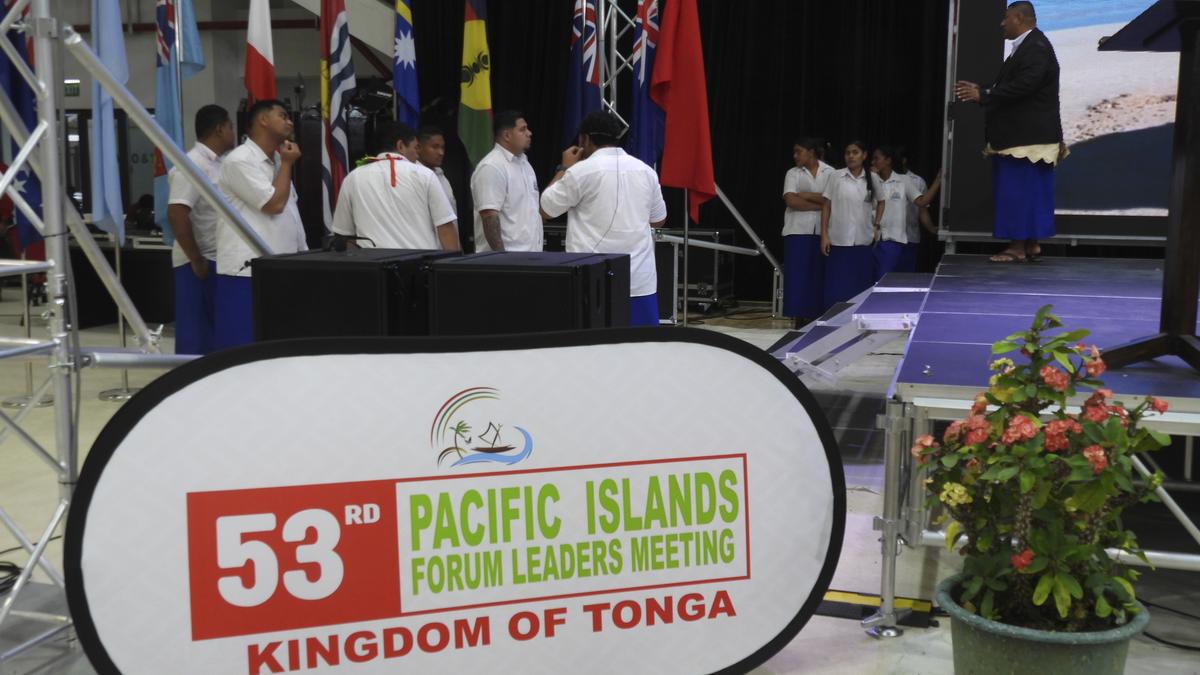The island nation of Tonga hosted the annual meeting of the Pacific Islands Forum leaders from August 26 to 30. The conference was attended by more than 1,500 delegates from 40 countries.
The Pacific Islands Forum, a group of island nations in Oceania, has grown in stature over the years as powerful nations seek to increase their influence in the region.
The Forum was established in November 1971, with Australia, the Cook Islands, Fiji, Nauru, New Zealand, Tonga and Western Samoa as founding members. In January 1972, the South Pacific Bureau for Economic Cooperation was established; in 1981 this was renamed the Forum Secretariat.

Currently, the forum has 18 member countries- Australia, Cook Islands, Federated States of Micronesia, Fiji, French Polynesia, Kiribati, Nauru, New Caledonia, New Zealand, Niue, Palau, Papua New Guinea, Republic of the Marshall Islands, Samoa, Solomon Islands, Tonga, Tuvalu and Vanuatu. Australia and New Zealand are among the larger countries in the bloc, with some countries having populations as low as 1,500 people. The Pacific Islands Forum envisions a “resilient Pacific region of peace, harmony, security, social inclusion and prosperity” that ensures that all Pacific people can lead free, healthy and productive lives.
Many of the Forum’s member countries are particularly sensitive to environmental challenges, making climate change and sea level rise key focuses for the Forum.
An important method of dispute resolution for the Forum is the “Pacific Way”, which seeks to build consensus and centres around relationships between countries in the “Blue Pacific Family”. Members of the Blue Pacific Family are linked by similar culture and heritage, and differentiate themselves from the broader Indo-Pacific region.
For this year’s summit, China sent the largest delegation in the forum’s history. The US also sent a large delegation, led by Deputy Secretary of State Kurt Campbell. The incoming president is Tongan Prime Minister Siaosi Sowaleni.
The most important issue discussed at the forum was the ongoing unrest in the French territory of New Caledonia, where violence between French authorities and locals left nine civilians and two policemen dead.
The indigenous Kanak people of New Caledonia have long sought independence from France, which colonized it in 1853. Even though it granted citizenship to all Kanak people in 1957, demands for independence have continued. The latest unrest follows efforts by the French government to expand voting lists in New Caledonia and amend its constitution to give more French residents the right to vote. The Kanak people have called voting on the matter in 2021 illegitimate – a position France refuses to accept.
The forum now plans to hold an official “talanoa” (dialogue) on the matter later this year.
In his address to the forum, UN chief Antonio Guterres backed efforts to raise climate funds to tackle regional issues. He said people are “using the sea as a sewer.” Water quality has deteriorated in many island nations as rising sea levels and natural disasters contaminate natural water sources.
Police Training Centre
Also under discussion is an Australian-funded Pacific police training centre, seen as a measure to counter China’s attempt to equip the law enforcement agencies of some island nations. The 400 million Australian dollar proposal envisages a regional policing scheme to improve training and create a multinational crisis response force comprising 200 officers. Four centres would be set up across the Pacific, with a hub in Brisbane. On 28 August, Pacific island leaders endorsed the plan. Recognising Taiwan at the forum has caused controversy. China and its allies, including the Solomon Islands, have sought to remove Taiwan as a development partner, indicating it is part of China. But the final declaration reaffirmed the 1992 agreement that allowed Taiwan to participate – the clause was later removed after criticism from Chinese officials at the forum.
In addition, the US territories Guam and American Samoa were made associate members of the forum, despite opposition from the Solomon Islands.

The Forum’s initial meeting did not attract widespread international interest, but that has changed in recent years. The Forum currently has 21 dialogue partners, with diplomats and civil society observers attending. There is a waiting list for admission, and the Forum is not accepting new members until it restructures its working model, which calls for a tiered model. Big powers have sought to exert influence over the resource-rich region. Chinese efforts to offer aid and military support to the region have attracted the interests of other powers. In 2022, China signed a security agreement with the Solomon Islands. It has also pressured countries in the group to refuse to include Taiwan, with the Solomon Islands, Kiribati and Nauru now accepting this status.
In the year 2022, amid China’s growing influence in the region, the US invited leaders from the Pacific region to a White House summit for the first time.
Earlier, only Australia and New Zealand worked as security partners in this region. Now the attention of superpowers is on this region.
